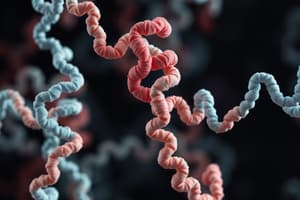Podcast
Questions and Answers
What do the regions indicated in a Ramachandran plot primarily assess?
What do the regions indicated in a Ramachandran plot primarily assess?
- The pH stability of proteins
- The molecular weight of amino acid residues
- The primary structure of amino acids
- The energetically favourable conformations of protein structures (correct)
Which quadrant of the Ramachandran plot contains the area where all conformations are allowed?
Which quadrant of the Ramachandran plot contains the area where all conformations are allowed?
- Quadrant-III
- Quadrant-I (correct)
- Quadrant-II
- Quadrant-IV
In which quadrant of the Ramachandran plot are right-handed alpha helices predominantly found?
In which quadrant of the Ramachandran plot are right-handed alpha helices predominantly found?
- Quadrant-I
- Quadrant-IV
- Quadrant-III (correct)
- Quadrant-II
Which dihedral angles are represented in a Ramachandran plot?
Which dihedral angles are represented in a Ramachandran plot?
What is one characteristic of the ω angle in a Ramachandran plot?
What is one characteristic of the ω angle in a Ramachandran plot?
Which region of the Ramachandran plot is characterized as having practically no allowed conformations due to steric hindrance?
Which region of the Ramachandran plot is characterized as having practically no allowed conformations due to steric hindrance?
Who were the original developers of the Ramachandran plot?
Who were the original developers of the Ramachandran plot?
What is indicated by the most favourable regions in a Ramachandran plot?
What is indicated by the most favourable regions in a Ramachandran plot?
What characterizes the structural stability of an alpha helix in proteins?
What characterizes the structural stability of an alpha helix in proteins?
How are beta sheets formed in the secondary structure of proteins?
How are beta sheets formed in the secondary structure of proteins?
Which amino acid allows for greater conformational flexibility in the Ramachandran plot due to its small side chain?
Which amino acid allows for greater conformational flexibility in the Ramachandran plot due to its small side chain?
In a Ramachandran plot, which region typically represents the alpha helix?
In a Ramachandran plot, which region typically represents the alpha helix?
What is the effect of larger side chains on the conformational space in the Ramachandran plot?
What is the effect of larger side chains on the conformational space in the Ramachandran plot?
What structural feature differentiates left-handed and right-handed alpha helices?
What structural feature differentiates left-handed and right-handed alpha helices?
What unique characteristic does proline exhibit in the context of the Ramachandran plot?
What unique characteristic does proline exhibit in the context of the Ramachandran plot?
What percentage of peptide bonds involving proline are in the cis configuration?
What percentage of peptide bonds involving proline are in the cis configuration?
What is the main purpose of the Ramachandran plot in protein structure analysis?
What is the main purpose of the Ramachandran plot in protein structure analysis?
Which amino acid has greater availability within the accessible regions of the Ramachandran plot?
Which amino acid has greater availability within the accessible regions of the Ramachandran plot?
Which of the following best describes a limitation of the Ramachandran plot?
Which of the following best describes a limitation of the Ramachandran plot?
Why is the Ramachandran plot important for drug design?
Why is the Ramachandran plot important for drug design?
What is the primary use of a Ramachandran plot in structural biology?
What is the primary use of a Ramachandran plot in structural biology?
Which of the following is a consequence of crystal packing effects in the context of a Ramachandran plot?
Which of the following is a consequence of crystal packing effects in the context of a Ramachandran plot?
What do the allowed regions in the Ramachandran plot represent?
What do the allowed regions in the Ramachandran plot represent?
How does the Ramachandran plot aid in identifying structural errors?
How does the Ramachandran plot aid in identifying structural errors?
Flashcards
Ramachandran Plot
Ramachandran Plot
A graphical representation of the dihedral angles (phi and psi) of amino acid residues in protein structures, used to assess the stereochemical quality of protein structures.
Phi (φ) Angle
Phi (φ) Angle
The angle of rotation around the bond between the nitrogen atom and the alpha carbon (N-Ca) of an amino acid residue.
Psi (ψ) Angle
Psi (ψ) Angle
The angle of rotation around the bond between the alpha carbon (Ca) and the carbonyl carbon (C) of an amino acid residue.
Allowed Region
Allowed Region
Signup and view all the flashcards
Disallowed Region
Disallowed Region
Signup and view all the flashcards
Alpha Helix
Alpha Helix
Signup and view all the flashcards
Beta Sheet
Beta Sheet
Signup and view all the flashcards
Turn
Turn
Signup and view all the flashcards
Methylene Group Influence
Methylene Group Influence
Signup and view all the flashcards
Glycine in Ramachandran Plot
Glycine in Ramachandran Plot
Signup and view all the flashcards
Proline in Ramachandran Plot
Proline in Ramachandran Plot
Signup and view all the flashcards
Pre-proline Restriction
Pre-proline Restriction
Signup and view all the flashcards
Cis Conformation
Cis Conformation
Signup and view all the flashcards
Trans Conformation
Trans Conformation
Signup and view all the flashcards
Ramachandran Plot Uses
Ramachandran Plot Uses
Signup and view all the flashcards
Study Notes
Ramachandran Plot Overview
- A Ramachandran plot, also known as a Ramachandran diagram, visually represents the dihedral angles (φ and ψ) of amino acid residues in protein structures.
- It helps confirm the structure of proteins by identifying energetically favorable regions in the plot.
- The plot aids in evaluating the accuracy and quality of protein structures.
- Developed by Viswanathan Sasisekharan, C. Ramakrishnan, and Gopalasamudram Narayana Ramachandran.
Plot Function
- The plot displays φ and ψ angles of amino acid residues in a peptide.
- It analyzes the stereochemical quality of protein structures.
- The peptide bond has a planar structure, maintaining a φ angle of almost exactly 180°.
- Favourable regions are visually presented as dark green, while areas with less favorable conformations are represented in light green.
Plot Quadrants
- Quadrant I: Contains allowed conformations, including left-handed α-helices.
- Quadrant II: The largest region, containing the majority of allowed dihedral angle values for protein conformation.
- Quadrant III: Includes right-handed α-helices and other favorable conformations.
- Quadrant IV: Shows conformations generally disfavored due to steric hindrances. ψ angles around 180-0° and φ angles around 0-180°.
Secondary Structures in Plots
- α-helices are represented by specific regions on the plot, reflecting the hydrogen bonding pattern in their structures.
- β-sheets are represented by other distinct regions, associated with specific phi and psi angles of amino acids in β-strands.
- Specific amino acids, such as Glycine, impact the conformational space shown in the plot.
Ramachandran Plot Uses
- Identifying and analyzing protein structure.
- Evaluating protein structures' accuracy.
- Helping determine regions of favourable and unfavourable steric clashes.
- Facilitating protein modelling and structure prediction.
- Assisting in drug design.
- Diagnosing experimental or computational protein structure errors.
Limitations of the Plot
- Simplifies complex protein conformations into a two-dimensional representation.
- May not perfectly represent the complexities of individual protein families.
- Quality is dependent on resolution; lower resolutions might introduce inaccuracies.
- Crystal packing or limited structural data may not be perfectly represented.
- Does not fully capture dynamic protein behaviors.
Studying That Suits You
Use AI to generate personalized quizzes and flashcards to suit your learning preferences.





